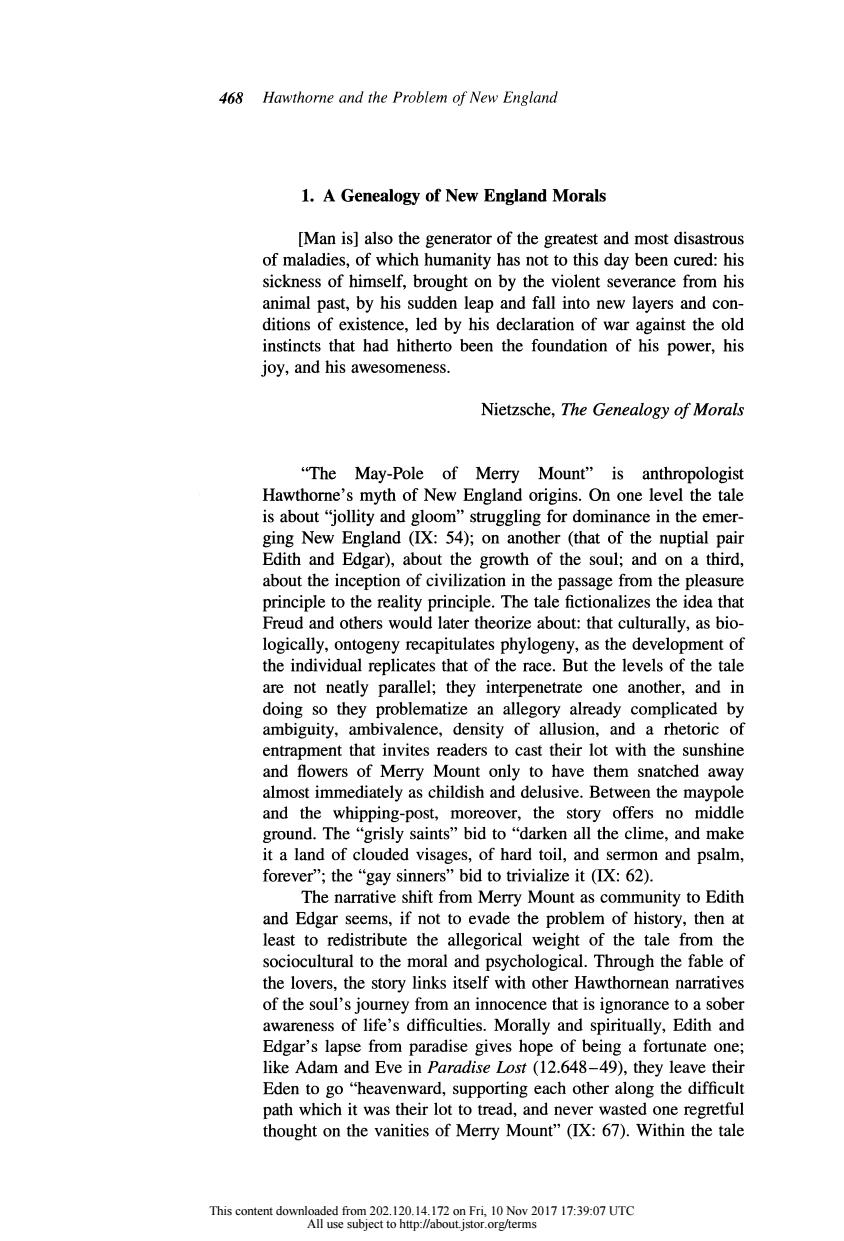正在加载图片...

468 Hawthorne and the Problem of New England 1.A Genealogy of New England Morals [Man is]also the generator of the greatest and most disastrous of maladies,of which humanity has not to this day been cured:his sickness of himself,brought on by the violent severance from his animal past,by his sudden leap and fall into new layers and con- ditions of existence,led by his declaration of war against the old instincts that had hitherto been the foundation of his power,his joy,and his awesomeness. Nietzsche,The Genealogy of Morals "The May-Pole of Merry Mount"is anthropologist Hawthorne's myth of New England origins.On one level the tale is about"jollity and gloom"struggling for dominance in the emer- ging New England (IX:54);on another (that of the nuptial pair Edith and Edgar),about the growth of the soul;and on a third, about the inception of civilization in the passage from the pleasure principle to the reality principle.The tale fictionalizes the idea that Freud and others would later theorize about:that culturally,as bio- logically,ontogeny recapitulates phylogeny,as the development of the individual replicates that of the race.But the levels of the tale are not neatly parallel;they interpenetrate one another,and in doing so they problematize an allegory already complicated by ambiguity,ambivalence,density of allusion,and a rhetoric of entrapment that invites readers to cast their lot with the sunshine and flowers of Merry Mount only to have them snatched away almost immediately as childish and delusive.Between the maypole and the whipping-post,moreover,the story offers no middle ground.The“grisly saints'”bid to“darken all the clime,and make it a land of clouded visages,of hard toil,and sermon and psalm forever";the "gay sinners"bid to trivialize it (IX:62). The narrative shift from Merry Mount as community to Edith and Edgar seems,if not to evade the problem of history,then at least to redistribute the allegorical weight of the tale from the sociocultural to the moral and psychological.Through the fable of the lovers,the story links itself with other Hawthornean narratives of the soul's journey from an innocence that is ignorance to a sober awareness of life's difficulties.Morally and spiritually,Edith and Edgar's lapse from paradise gives hope of being a fortunate one; like Adam and Eve in Paradise Lost (12.648-49),they leave their Eden to go "heavenward,supporting each other along the difficult path which it was their lot to tread,and never wasted one regretful thought on the vanities of Merry Mount"(IX:67).Within the tale This content downloaded from 202.120.14.172 on Fri,10 Nov 2017 17:39:07 UTC All use subject to http://about.jstor.org/terms468 Hawthorne and the Problem of New England 1. A Genealogy of New England Morals [Man is] also the generator of the greatest and most disastrous of maladies, of which humanity has not to this day been cured: his sickness of himself, brought on by the violent severance from his animal past, by his sudden leap and fall into new layers and con ditions of existence, led by his declaration of war against the old instincts that had hitherto been the foundation of his power, his joy, and his awesomeness. Nietzsche, The Genealogy of Morals "The May-Pole of Merry Mount" is anthropologist Hawthorne's myth of New England origins. On one level the tale is about "jollity and gloom" struggling for dominance in the emer ging New England (IX: 54); on another (that of the nuptial pair Edith and Edgar), about the growth of the soul; and on a third, about the inception of civilization in the passage from the pleasure principle to the reality principle. The tale fictionalizes the idea that Freud and others would later theorize about: that culturally, as bio logically, ontogeny recapitulates phylogeny, as the development of the individual replicates that of the race. But the levels of the tale are not neatly parallel; they interpenetrate one another, and in doing so they problematize an allegory already complicated by ambiguity, ambivalence, density of allusion, and a rhetoric of entrapment that invites readers to cast their lot with the sunshine and flowers of Merry Mount only to have them snatched away almost immediately as childish and delusive. Between the maypole and the whipping-post, moreover, the story offers no middle ground. The "grisly saints" bid to "darken all the clime, and make it a land of clouded visages, of hard toil, and sermon and psalm, forever"; the "gay sinners" bid to trivialize it (IX: 62). The narrative shift from Merry Mount as community to Edith and Edgar seems, if not to evade the problem of history, then at least to redistribute the allegorical weight of the tale from the sociocultural to the moral and psychological. Through the fable of the lovers, the story links itself with other Hawthornean narratives of the soul's journey from an innocence that is ignorance to a sober awareness of life's difficulties. Morally and spiritually, Edith and Edgar's lapse from paradise gives hope of being a fortunate one; like Adam and Eve in Paradise Lost (12.648-49), they leave their Eden to go "heavenward, supporting each other along the difficult path which it was their lot to tread, and never wasted one regretful thought on the vanities of Merry Mount" (IX: 67). Within the tale This content downloaded from 202.120.14.172 on Fri, 10 Nov 2017 17:39:07 UTC All use subject to http://about.jstor.org/terms